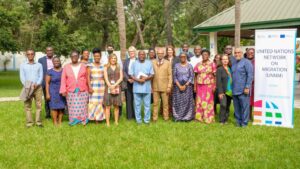Effective management of migration has the potential to unleash immense socio-economic development, United Nations Resident Coordinator in Ghana, Charles Abani, has said.
Globally, migration dynamics continue to follow the same overarching trajectory – with the number of international migrants increasing from 272 million in 2019 to 281 million people in 2020, accounting for 3.6 percent of the global population, according to International Organisation for Migrant’s World Migration Report. Of the 2020 number, 169 million were labour migrants – giving emphasis to the fact that the majority of migration occurs for economic reasons.
Available data from the United Nations Department for Economic and Social Affairs (UNDESA) also indicate that an estimated 7.9 million migrants reside in the ECOWAS region. Furthermore, more than five of every eight migrants from West Africa stay within the region; with the remainder moving toward other destinations in Africa, Asia, Europe and North America.
Against this backdrop, Mr. Bani – speaking at the EU-UN Building Migration Partnership Project launch in Accra – said collaboration between states and across governmental systems is critical to developing strategies for efficient migration governance in Ghana in order to accelerate progress toward achieving socioeconomic growth in line with the Sustainable Development Goals, particularly Goal 10, target 10.7 – facilitating orderly, safe, regular and responsible migration and mobility of people.
“We must ensure there is a joined-up approach to our actions that leverages all expertise to deliver lasting and sustainable outcomes. This is especially true for cross-cutting issues such as migration. With this project, and through the UN Network on Migration, we can demonstrate our intentional approach to deliver as one and be more responsive to the government of Ghana’s needs as far as migration is concerned,” he said.

Ghana is seen as a country of origin, transit and destination and is faced with the task of managing complex migration dynamics – with data from UNDESA pointing to an estimated one million Ghanaians living outside the country and a little over 470,000 international migrants residing in Ghana, as of 2020… representing 1.5 percent of the total resident population. Additionally, Ghanaians residing outside the country contribute US$4.29billion in remittances; equivalent to 6.1 percent of the gross domestic product, said the World Bank in 2022.
The Chief of Mission at the International Organisation for Migration (IOM), Fatou Dialo Ndiaye, stated that despite the progress made in improving migration governance in Ghana, there are critical actions which must be taken immediately to ensure the effective implementation of migration policies and related sectoral policies.
These policies, she said, must address gaps in vertical and horizontal coordination on migration issues to improve the availability of quality migration data so as to inform evidence-based policies.
To this end, Ms. Ndiaye reiterated IOM’s commitment and resolve to improving the country’s migration management architecture, in order to help unleash the development potentials inherent in effective management of migration, saying: “Migration, when managed effectively, can be the byword for development and accelerate progress toward achieving Sustainable Development Goals”.
With migration governance being a top priority, the country has voluntarily agreed to serve as a champion for the Global Compact on Migration (GCM). Ghana’s role as a champion country for GCM implementation is critical in demonstrating support for the GCM, including galvanising support for a productive process of GCM regional reviews.










